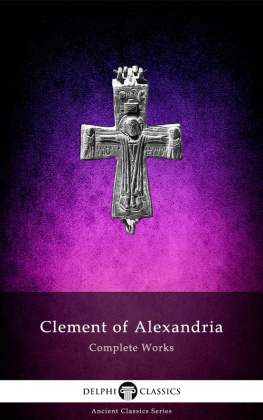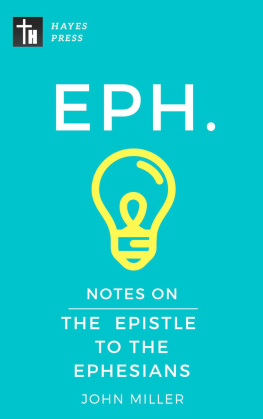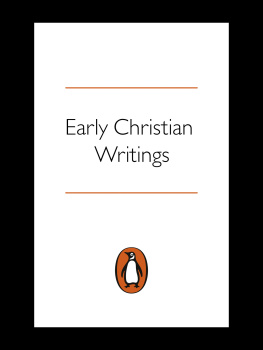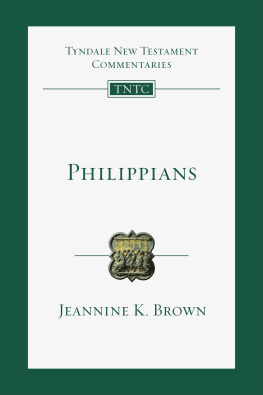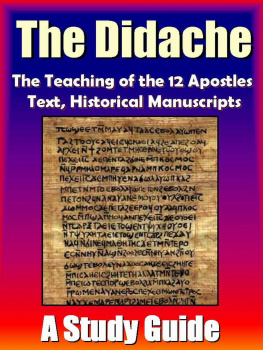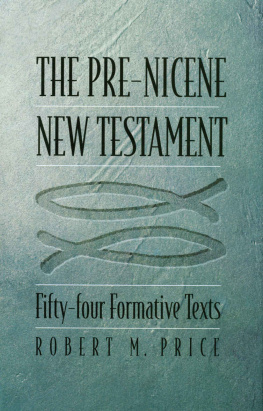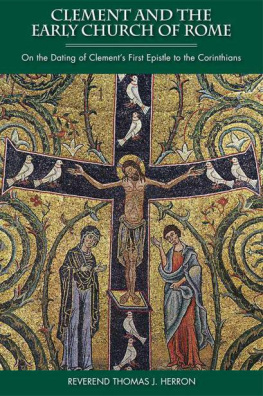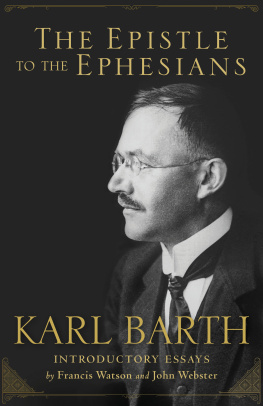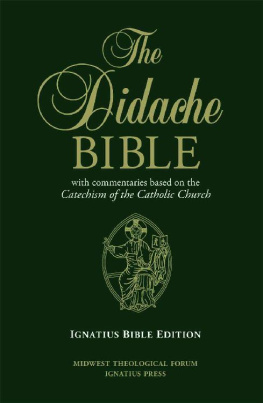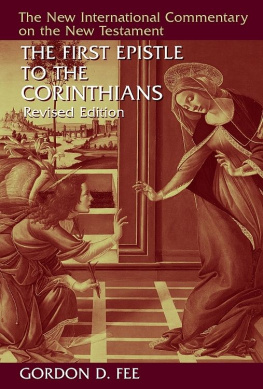
1989, 2006 Michael W. Holmes
Published by Baker Academic
A division of Baker Publishing Group
P. O. Box 6287, Grand Rapids, MI 49516-6287
www.bakeracademic.com
The first edition, published by Baker in 1956 as The Apostolic Fathers and reprinted through 1989, reproduced the English translations by J. B. Lightfoot, as edited and completed by J. R. Harmer, from the diglot published at London by Macmillan and Company in 1891.
For the second edition, published by Baker in cloth in 1989 and in paper in 1998, Michael W. Holmes extensively revised the Lightfoot-Harmer translation and added introductions and notes.
This third edition incorporates further revisions to the translation to enhance accuracy, clarity, and conformity to current English usage. These and other enhancements are described in the preface to the third edition.
Ebook edition created 2012
All rights reserved. No part of this publication may be reproduced, stored in a retrieval system, or transmitted in any form or by any meansfor example, electronic, photocopy, recordingwithout the prior written permission of the publisher. The only exception is brief quotations in printed reviews.
eISBN 978-1-5855-8500-7
Library of Congress Cataloging-in-Publication Data is on file at the Library of Congress, Washington, DC.
Contents
Preface to the Third Edition
The first edition of this English translation of the Apostolic Fathers was executed by J. B. Lightfoot and J. R. Harmer, published at London by Macmillan and Company in 1891, and reprinted by Baker Book House in 1956. In the mid-1980s, at the invitation of Baker Book House, I undertook a revision of the Lightfoot-Harmer translation, taking into account both changes in English usage and advances in scholarship while at the same time generally preserving Lightfoots and Harmers interpretative decisions (to the extent that all significant deviations from Lightfoot-Harmer, both textual and interpretative, were footnoted). The resulting second edition was published in 1989. That same English version was reprinted (with a small number of revisions in addition to typographical corrections here and there) in The Apostolic Fathers: Greek Texts and English Translations of Their Writings , 2nd ed., published by Baker Book House in 1992 in hardcover. The updated edition of the latter, published in paperback in 1999, again corrected some minor errors, but the English version remained essentially unchanged.
In 2003, the editors at Baker Academic offered the opportunity to collaborate on a major revision of the English translation. Their intention was partly to improve the design and typography of the volume to render it more user-friendly for introductory-level students and general readers. (For example, they wanted to provide running heads with chapter and verse numbers to facilitate quick reference; they suggested adding subheadings within the translations to indicate the content of sections; and they thought the notes could be presented more conveniently.) In addition we believed that the translation itself, well received by reviewers and users, nonetheless could be further improved.
The result of our collaboration is a thoroughly revised translation. In addition to substantive changes in the translation, various stylistic details such as spelling, punctuation, and capitalization have in general been conformed to current usage as represented in the New Revised Standard Version of the Bible (though in some cases, special usages in one or more of the texts in this volume seemed to warrant capitalization of terms that are lowercase in the NRSV and other literature). The number of cross-references to scripture has been increased in the third edition. Notes indicating points of textual variation have been simplified; readers who wish to know what particular manuscripts and versions support each variant may consult the textual apparatus in The Apostolic Fathers: Greek Texts and English Translations .
In addition, the new edition pays closer attention than before to the gender of pronouns and to the use of masculine terms such as brother. Rather than adding and sisters or the like mechanically wherever a form of adelphoi occurs in the Greek, I have attempted to make all such decisions in a context-sensitive manner. Where I judged that by adelphoi the writer was probably referring exclusively to males, the translation reads simply brothers. Where I judged that the writers intention was inclusive, it reads brothers and sisters. Furthermore, there are places where the Greek text reads adelphoi kai adelphai (brothers and sisters), or where the translation renders a phrase (rather than the single word adelphoi ) as brothers. So that readers are not left guessing, wherever the translation reads brothers and sisters a note indicates whether the Greek is adelphoi or adelphoi kai adelphai , and if brothers represents something other than adelphoi a note so indicates. Readers can therefore know that wherever the translation reads simply brothers (with no note attached), the Greek text has adelphoi ; in any other circumstance a note will indicate how the Greek text reads. In addition, various strategies were used to avoid inclusive use of masculine pronouns wherever possible. Attentive readers will spot instances here and there where no grammatical and graceful alternative could be found.
In view of the scope of these changes, it no longer seemed appropriate or necessary to continue to signal in the notes all significant differences in text and interpretation from the Lightfoot-Harmer version. This third edition, then, while genetically descended from the Lightfoot-Harmer translation, is in effect a fresh and comprehensive revision.
In addition to changes in the translation and notes, I have revised the introductions to the volume and to each writing in the corpus and updated the bibliographies (which, in view of the goals of this edition, are limited to English-language works; works in other languages may be found in the bibliographies in the Greek-English edition).
A number of obligations have been incurred during the revision process, and I am glad to have this opportunity to acknowledge them. Of the various editors and proofreaders who assisted in the production of this new edition, special thanks must go to Paul Peterson, who read the whole more than once and suggested numerous improvements to the translation and the notes, and Dr. James Ernest, editor at Baker Academic and a patristic scholar in his own right, who not only broached the possibility of a revision but subsequently invested a great deal of time and energy in it. Several colleagues generously offered advice, suggestions, or assistance, including Dr. Allen Brent (University of Cambridge), Dr. Paul Foster (University of Edinburgh), Dr. James Rhodes (St. Michaels College), Dr. Frank Shaw (University of Dayton), Dr. Nancy Pardee (Saint Xavier University), and Mr. Trevor Thompson and Mr. Brandon Cline (University of Chicago). Finally, my teaching assistant, Marissa Cwik, provided valuable assistance at a key stage of the revision. I am grateful to each of them for their contributions.
Michael W. Holmes
Pentecost, 2006
Preface to the Second Edition
Joseph Barber Lightfoot (18281889), sometime Hulsean and Lady Margaret Professor of Divinity at the University of Cambridge and later Bishop of Durham, is widely recognized as one of the greatest New Testament and patristic scholars England has ever produced. He was a scholar of unrivaled erudition, clarity of insight, and sobriety of judgment (an assessment with which on the Continent no less a scholar than Adolf von Harnack concurred). As renowned as he is for his biblical commentaries, whose luster the passing of a century has scarcely diminished, it is his work on the Apostolic Fathers that must be reckoned as his most enduring contribution. His treatment of Ignatius, for example, continues to represent, in the estimation of William R. Schoedel (a distinguished commentator in his own right), an inescapable point of departure for all work on the Antiochian bishop.
Next page







